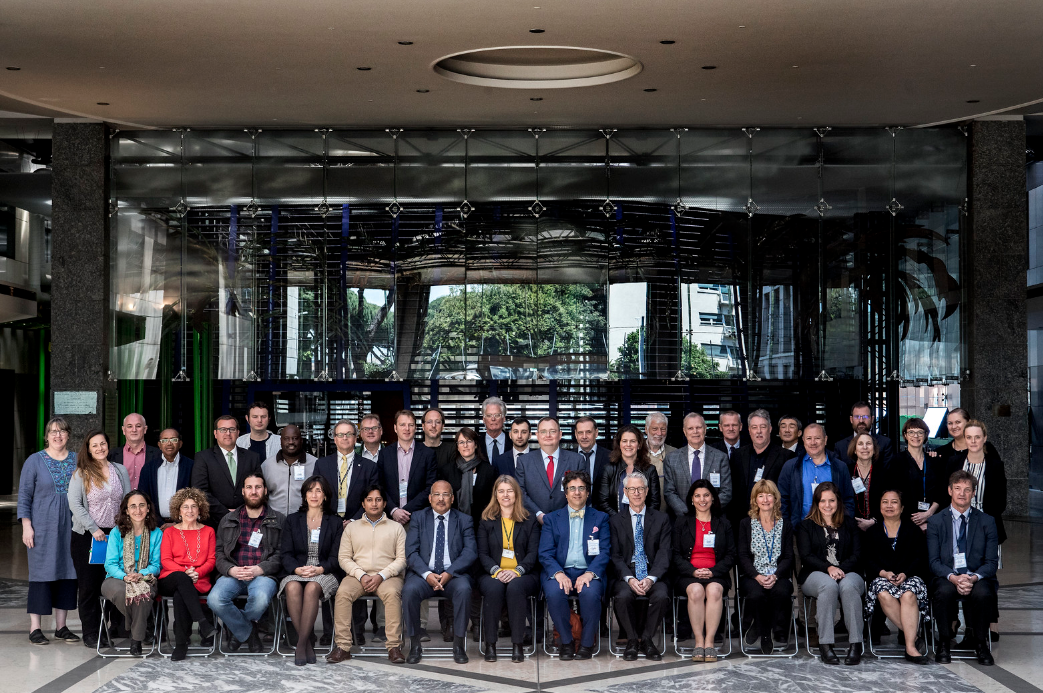ABNJ Deep Sea Meeting
 OSPAR attended an event hosted by the Food & Agriculture Organization of the United Nations in Rome from 7-9 May 2019. The event was organised by the partners of the Common Oceans ABNJ Deep Seas Project, to showcase existing knowledge, practices, and innovative research for sustainable deep-sea fisheries management and biodiversity conservation in the areas beyond national jurisdiction (ABNJ).
OSPAR attended an event hosted by the Food & Agriculture Organization of the United Nations in Rome from 7-9 May 2019. The event was organised by the partners of the Common Oceans ABNJ Deep Seas Project, to showcase existing knowledge, practices, and innovative research for sustainable deep-sea fisheries management and biodiversity conservation in the areas beyond national jurisdiction (ABNJ).
Susana Salvador, OSPAR Executive Secretary, gave a presentation entitled 'OSPAR (Climate change and ecosystems, ecological and biological impacts)'.
Climate change and ocean acidification
The OSPAR North-East Atlantic Strategy 2010-2020 states that the “first effects of climate change and ocean acidification are apparent throughout the OSPAR Maritime Area and pressures on the marine environment from climate change and ocean acidification are set to grow”. So, OSPAR is to monitor and assess the nature, rate and extent of the effects of climate change and ocean acidification on the marine environment and consider appropriate ways of responding to those developments. A chapter of the last assessment of the marine environment published in 2017 - Intermediate Assessment - addressed marine climate change and looked at trends in sea water temperature, sea ice, sea level, salinity, storms and waves, and ocean pH, as well as changes on land, including glaciers and snow-covered areas.
Marine ecosystems are subject to a variety of concurrent pressures such as warming, eutrophication, hypoxia, and pollution, which may act in concert to produce responses that may be additive, synergistic or antagonistic. The assessment of cumulative effects is thus part of the OSPAR guiding principle - the Ecosystem approach - and it aims at addressing the causes, pathways of exposure and consequences of these effects from multiple human activities, on the ecosystem components. A specific expert group - ICG-EcoC – studies the systematic procedure for identifying and evaluating their significance so to estimate the overall expected impact.
OSPAR recently established another expert group - ICG-OA - to work on the subject of ocean acidification, in particular towards the development of a new assessment indicator to be used for the next overall marine assessment of the North-East Atlantic to be produced and launched by OSPAR in 2023 – the Quality Status Report.
Protection of biodiversity
OSPAR has a wide mandate when it comes to identifying and assessing specific species, habitats and features in need of protection within the OSPAR maritime area. The role of OSPAR is based on the ecosystem approach and its mandate for setting in place an integrated process for the protection of marine areas in ABNJ having regard to human activities and their cumulative impacts. This includes the assessment of the status of the environment, the identification of features in need for protection, as well as the establishment of conservation objectives and monitoring measures.
The definition of Marine Protected Area (MPA) is provided by OSPAR Recommendation 2003/3 implementing Annex V of OSPAR Convention as “an area within the maritime area for which protective, conservation, restorative or precautionary measures, consistent with international law have been instituted for the purpose of protecting and conserving species, habitats, ecosystems or ecological processes of the marine environment”.
This Recommendation defines the OSPAR MPA network as including sites within national jurisdiction and “any area in the maritime area outside the jurisdiction of the Contracting Parties which has been included as a component of the network by the OSPAR Commission”, expressly envisaging that these marine protected areas can be designated in areas beyond national jurisdiction, which is considered particularly important for the protection and conservation of highly mobile species, such as certain birds, marine mammals and fish, and to safeguard the critical stages and areas of their life cycle (such as breeding, nursery and feeding areas).
For more information on the FAO

